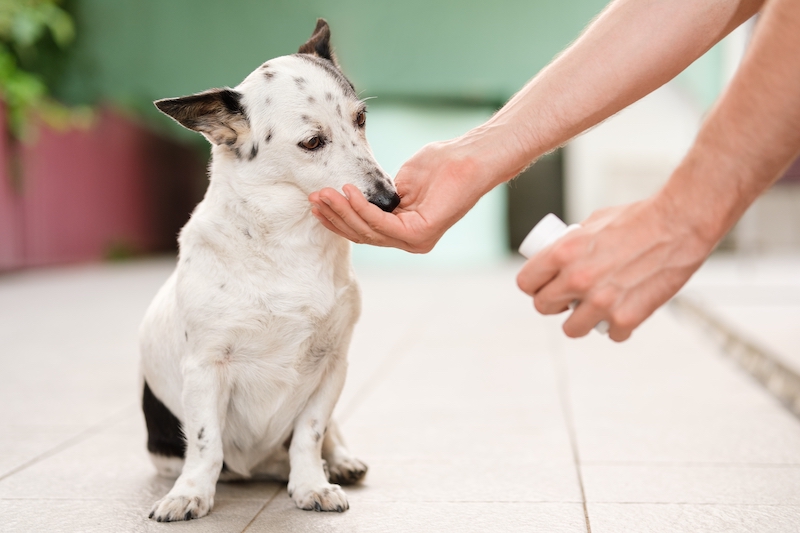Does My Pooch Need Probiotics?
6 signs that probiotics could benefit your pup’s health.

6 signs that probiotics could benefit your pup’s health.

As awareness of the importance of dog gut health continues to rise, so does the use of probiotics for our canine companions.
Dog probiotics are more than just a trend—they can offer substantial health benefits for dogs, from enhancing their digestive function to strengthening their immune system.
We’ll take a look at how they could be instrumental in keeping your dog happy and healthy.
Just like humans, dogs have billions of bacteria in their gut, including a balance of both beneficial and harmful types.
When your dog has too much bad bacteria—and not enough good—it can lead to digestive issues, skin conditions, and a weakened immune system.
Dog probiotic supplements are packed with good bacteria to help restore and maintain balance in your dog’s gut.
Sometimes vets recommend dog probiotics as a preventative measure to support a dog’s digestive health and overall well-being, and might even prescribe them for the treatment of specific conditions.
Probiotics for your pup can come in various forms—like chews, powders, or capsules.

There are certain cases when your dog might require probiotics as treatment for specific conditions. Look out for these six signs that might indicate that your dog should take probiotics.
If your dog is experiencing regular bouts of diarrhea, constipation, or bloating, it could mean a bigger issue with their gut health. Probiotics can help balance the digestive tract and alleviate these symptoms.
Dogs that eat a diet of highly processed dog food may benefit from probiotics. Highly processed dog foods can cause an imbalance in the gut microbiome, potentially leading to digestive issues. Dog probiotics can help restore a healthy gut by replenishing good bacteria.
Taking antibiotics can wipe out both bad and good bacteria in your dog’s body. Probiotics can restore gut health after your dog has been on a course of antibiotics, by building up that good bacteria again.
Don’t blame poor Fido for his halitosis. Persistent bad breath in dogs can sometimes be a sign of an imbalanced gut microbiome. Probiotics can help restore this balance and improve your dog’s overall oral health.
If your dog is prone to yeast infections, it may be a sign of too much bad bacteria in their gut. Probiotics can help balance the gut flora, preventing such infections.
Food allergies can often be linked to an imbalanced gut microbiome. Probiotics can help maintain a healthy gut, potentially reducing allergic reactions.
It’s important to remember that these signs can be symptoms of other health issues too, and some dogs can be allergic to certain probiotic supplements. Always consult your vet before starting your dog on any new treatment or supplement regimen.
Probiotics are generally safe, but it’s important to get a professional’s advice to ensure the best course of action for your pet’s health.
Dog probiotics don’t only act as treatment. They can also be used as a preventative measure to help maintain your dog’s overall health and wellness.
Here’s a closer look at some of the the potential benefits of incorporating dog probiotic supplements into your dog’s diet:
Keep in mind that dog probiotics might not be the best fit for every pup. We recommend consulting with your veterinarian.
Ready to put on your life science hat?
All three of these types of “biotics” work together to maintain a healthy gut and promote overall well-being, but they each serve a slightly different function.
Essentially “food” for probiotics, prebiotics are usually non-digestible fibers that your dog’s body can’t break down, so they make it to the colon where they feed the beneficial bacteria (probiotics) that live there. Prebiotics help the probiotics to thrive and multiply.
The live and active good bacteria that are naturally present in the gut, but can also be taken as supplements. They help to maintain a healthy balance of gut bacteria, support the immune system, and promote overall health.
The byproducts, or end products, of the fermentation process that probiotics undergo in your dog’s gut. These can include vitamins, enzymes, and other compounds that also have beneficial effects on health.
In simple terms, prebiotics feed the probiotics, and then probiotics produce postbiotics.

The market is full of a variety of dog probiotics, including chews, powders, and capsules. Here are some key points to consider to make sure your dog’s probiotics meet their specific needs:
Most probiotics should be kept in a cool, dry place away from heat and moisture. Depending on the specific product, they may need to be refrigerated to ensure the live organisms they contain stay viable. However, many modern probiotics are freeze-dried and shelf-stable (meaning they don’t need refrigeration).
Read and follow the storage instructions and expiration dates on the product packaging. Some products may have specific requirements depending on the strains of bacteria they contain.
It’s always a good idea to keep the probiotic container tightly sealed when not in use to avoid exposure to air, which could decrease its effectiveness. And, of course, keep it out of reach of curious pets to prevent any accidental overconsumption.
While most dogs handle probiotics well, potential side effects can occur. These might include:
Side effects are generally mild and often resolve as your dog’s body gets used to the new beneficial bacteria in its system.
However, if you notice any severe reactions, or if your dog appears to be in distress, it’s essential to stop the probiotic and consult with your vet immediately.
Whether pet insurance covers probiotics depends on your insurance provider, the type of coverage you have, and the type of probiotic you use. For example, a Lemonade Pet policy may cover certain probiotics if they are prescribed by a licensed vet for the treatment of a specific condition.
But if your dog takes probiotics as a preventive measure, or eats a prescription dog food that includes probiotics, it probably won’t be covered by your pet insurance. It’s important to check the specifics of your policy to understand what pet insurance covers.
A base policy at Lemonade helps take a bite out of vet bills for diagnostics and treatments related to accidents and illnesses (provided those occur after your policy’s waiting period has ended). And you can easily customize your pup’s policy with our preventative care packages and optional add-ons to meet the unique needs of your pup, all with your budget in mind.
Click below to get your quote started.
A few quick words, because we <3 our lawyers: This post is general in nature, and any statement in it doesn’t alter the terms, conditions, exclusions, or limitations of policies issued by Lemonade, which differ according to your state of residence. You’re encouraged to discuss your specific circumstances with your own professional advisors. The purpose of this post is merely to provide you with info and insights you can use to make such discussions more productive! Naturally, all comments by, or references to, third parties represent their own views, and Lemonade assumes no responsibility for them. Coverage may not be available in all states.
Please note: Lemonade articles and other editorial content are meant for educational purposes only, and should not be relied upon instead of professional legal, insurance or financial advice. The content of these educational articles does not alter the terms, conditions, exclusions, or limitations of policies issued by Lemonade, which differ according to your state of residence. While we regularly review previously published content to ensure it is accurate and up-to-date, there may be instances in which legal conditions or policy details have changed since publication. Any hypothetical examples used in Lemonade editorial content are purely expositional. Hypothetical examples do not alter or bind Lemonade to any application of your insurance policy to the particular facts and circumstances of any actual claim.